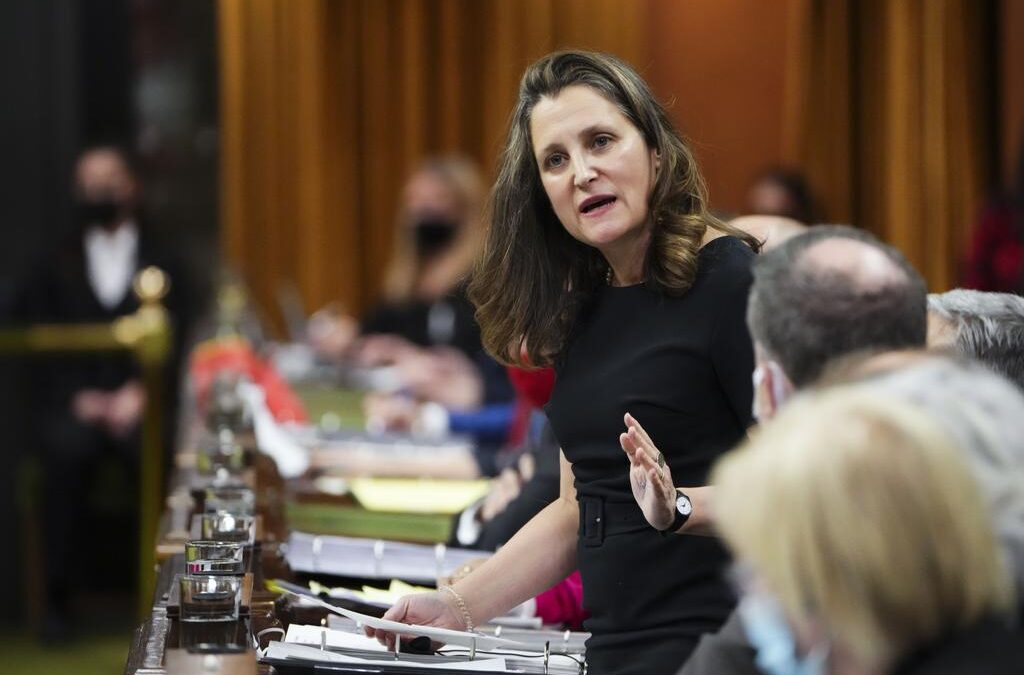| Freeland’s Economic and Fiscal Update Prepares for Omicron, Pays for First Nation Child Services
Today, Deputy Prime Minister and Finance Minister Chrystia Freeland delivered the Fall fiscal update to the House of Commons. Minister Freeland delivered the speech via video conference because two of her staff tested positive for COVID-19 earlier in the day.
The full economic update can be downloaded here:
https://www.budget.gc.ca/efu-meb/2021/report-rapport/EFU-MEB-2021-EN.pdf
The update was sprinkled with new spending to continue fighting the pandemic, as Canada assesses the threat posed by the new Omicron variant. This includes $2 billion in new spending for COVID-19 therapeutics, $1.7 billion for rapid tests and $4.5 billion for unanticipated future costs.
Notably, the government set aside $40 billion in the update to compensate First Nation children and families and to fund Indigenous child & family services reforms. Half of this amount will pay for a pending settlement in response to a ruling by the Canadian Human Rights Tribunal that found discrimination against Indigenous children by the state.
Among the topline economic news, the update announced:
-
-
-
-
- Canada’s deficit has shrunk to $144.5 billion from $154.7 billion projected in the spring budget – still far above historical norms due to the pandemic response.
- Canada has recovered 106% of jobs lost since the start of the pandemic, demonstrating strong labour market resilience which is primarily responsible for the lower deficit.
- “Private sector economists expect solid real GDP growth of 4.6 per cent in 2021, down from the gain of 5.8 per cent expected in Budget 2021… Real GDP growth should then remain solid at 4.2 per cent in 2022 and 2.8 per cent in 2023, stronger than expected in Budget 2021.”
- The government has stress tested its projections for a possible 1% interest rate increase, which would decrease the budgetary balance by $4.9 billion in the first year, $5.8 billion in the second year, and $6.4 billion in the fifth year.
The major spending items in the update include the following:
Affordability Measures:
-
-
-
-
- On January 1, 2022, the government will apply Canada’s first national tax on vacant property owned by non-resident, non-Canadians. This tax will be 1% on the value of non-resident, non-Canadian owned residential real estate in Canada.
- The luxury tax, proposed in Budget 2021, is currently the subject of consultations at the Department of Finance.
- The Government has reaffirmed its commitment to establishing an international framework for taxing digital services, and has set January 1st, 2024 as the target date for implementation.
- Seniors whose Guaranteed Income Supplement was clawed back because of CERB will be refunded the amount clawed back, via $742.4 million in one-time payments.
Immigration Targets:
-
-
-
-
- The government is committed to bringing in 411,000 immigrants in 2022, the highest number in Canadian history.
- To help support this effort and reduce processing time for permanent and temporary resident and citizenship applications, The government is investing $85 million in our immigration system.
Revised COVID Supports:
-
-
-
-
- This fiscal update sets aside a further $1.7 billion to procure more than 180 million additional rapid tests.
- To support the procurement of COVID-19 therapeutics, and associated logistics and operational costs, the government proposes to provide up to $2 billion over two years, starting in 2021-22, to the Public Health Agency of Canada.
- Additional $4.5 billion to pay for possible further costs of fighting Omicron and other COVID-19 surges, including spending on border measures and income and business supports. This is in addition to $7.4 billion earmarked for future pandemic response in budget 2021.
First Nations Child and Family Services Compensation:
-
-
-
-
- The update books $16 billion in new spending for fiscal 2020-21 (last year) and between $3.7-$4.2 billion annually over the next six years (2021-27, of which $20 billion is earmarked for compensation and $20 billion is to improve the system going forward.
BC Disaster Response Funding:
-
-
-
-
- The government has earmarked $5 billion for BC disaster response, and is working to finalize Canada’s first National Adaptation Strategy for climate change by the end of 2022.
Today’s Economic and Fiscal Update comes as the Prime Minister will meet with the Premiers this evening to discuss a coordinated response to the Omicron variant. Counsel’s team will be monitoring any new measures coming out of these discussions to ensure that your organization has the information it needs to adapt as soon as possible.
|

